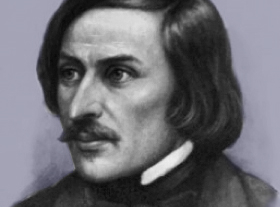
Nikolai Gogol emerged on the Russian literary scene in 1831 with the publication of Evenings on a Farm Near Dikanka. This initial success failed to cool his ambitions, as the letter below demonstrates. The play he writes about, Vladimir of the Third Degree, exists today only in fragments. According to diary entries of audience members who went to the production in 1834, Vladimir told the story of a soldier hungry for distinction. His desire eventually swells to such a magnitude that he believes himself transformed into the medal of decoration he so wished to receive.
February 20, 1833. St. Petersburg.
M. Pogodin,
…I don’t know why I thirst so much for contemporary fame now. The entire depth of my soul fairly bursts out. But I have still written absolutely nothing. I didn’t write you: I am possessed with the idea of a comedy. When I was in Moscow, on the road, and when I arrived here I couldn’t get it out of my head; but I still haven’t written anything. The other day I was even about to begin to form the plot; the title was already written on a thick white notebook: Vladimir of the Third Degree. And how much malice! laughter! salt! But suddenly I stopped, seeing how my pen kept knocking against points which the censorship wouldn’t pass for anything. And what does it mean if the play would not be performed? Drama lives only on the stage. Without the stage it is like a soul without a body. What maser painter will exhibit an unfinished work to the people? Nothing is left for me to do but invent the most innocent plot, something which couldn’t even offend a policeman. But what is comedy without truth and malice? So I can’t begin a comedy. I take up History—and the stage moves before me, the applause rings out, mugs stick out of the loges, gallery, parterre, and bare their teeth, and—to hell with history. And that’s why I’m sitting with my thoughts inactive….
From Letters of Nikolai Gogol. Edited by Carl R. Proffer. Ann Arbor: University of Michigan, 1967. p. 44.
FURTHER READING
Gogol and the rise of prose in Russia.
Other short stories in which the heroes lose objective sense of their surroundings.
The recent re-translation of Dead Souls.


